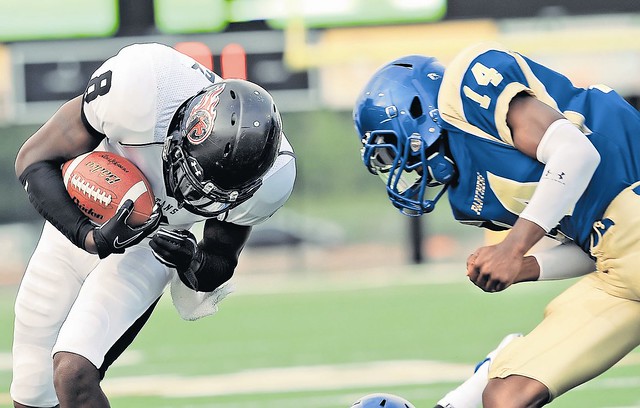Should high school football be banned?
by Michael Cook | 12 Dec 2015 | 1 comment

Bioethics is closing in on American football. An expert on concussion writing in the New York Times says that children should be allowed to play until they have reached the age of consent.
It is our moral duty as a society to protect the most vulnerable of us. The human brain becomes fully developed at about 18 to 25 years old. We should at least wait for our children to grow up, be provided with the information and education on the risk of play, and let them make their own decisions. No adult, not a parent or a coach, should be allowed to make this potentially life-altering decision for a child.Dr Bennet Omalu, who first diagnosed Chronic Traumatic Encephalopathy (CTE) in 2002 (and is the subject of the recent film Concussion), says that young players are at risk of “major depression, memory loss, suicidal thought and actions, loss of intelligence as well as dementia later in life [and] drug and alcohol abuse as the child enters his 20s, 30s and 40s”.
In January the American Journal of Bioethics is to publish an even starker picture of the risks of football. Steven H. Miles and Shailendra Prasad argue in a pre-publlication blog post that public school tackle football programs should be banned because of the high prevalence of concussions.
The authors discuss two additional complications in addition to the possible harm that football can cause: consent and dual loyalty.
High school players are not capable of giving informed consent, they say. Existing consent forms do not quantity risk or minimize it. They do not take into consideration pressure from parents who hope that their son will become a professional athlete. And coaches and doctors are often caught between putting the players’ health first and maximising the interests of the “youth football industry”. They conclude:
… we believe that this is a time for “primordial prevention” that remediates “environmental, economic, social and behavioral conditions, cultural patterns of living known to increase the risk of disease.” For health care professionals, primordial prevention might commend ending support for football in public schools. By this option, health professionals would oppose public support for bonds to build stadiums or athletic facilities for junior or senior high school football. They would oppose public school programs granting academic credit for playing football or leave of absences for practice or games. Such a proposal would not ban youth football. Private play and private leagues, like the Pop Warner program, would continue. Young people choosing such programs would play purely for the game and not be lured by ‘school spirit.’ Health professionals would continue to promote life long exercise programs and school physical education programs. However, under this proposal, the medical community could help students, schools and society leave a sport on which the sun is setting.This is a topic which will guaranteed to get a lot of publicity in January, with the publication of the AJOB, the release of Concussion (which has been tagged "the Christmas Movie the NFL Doesn't Want You to See", and the run-up to the Super Bowl.

Now that Australian euthanasia activist Philip Nitschke has burned his medical registration rather than give up promoting the right to die, he is tackling his Big Idea: rational suicide.
He is planning to hold a seminar in Melbourne next September to show that people do not have to be depressed or terminally ill to want to die. “The reality is, a portion of our population will suicide and I don’t think we should make it so hard,” Nitschke told The Guardian. He believes that bereaved spouses, long-term prisoners, and all old people should have access to lethal medications so that they can kill themselves.
Australia’s National Mental Health Commissioner, Professor Ian Hickie was appalled by Nitschke’s remarks and spoke out with unusual frankness:
“Nitschke has no understanding of mental health and related issues, and absolutely no empathy. He has demonstrated a lack of humanity and a lack of concern for those who find themselves in these situations and their families, and a complete lack of compassion for those who are socially isolated and trying to connect with their world. I find it a totally unacceptable and appalling idea that age is a proxy for the end of your useful life. To reinforce that is an abhorrent idea.”
However, Nitschke has raised – or rather revived, for the Greeks and Romans discussed the same topic – a good question. If life is really a good, can it ever be rational to take it? If it is not unconditionally good, why can’t we take it? What gives life any value? I can’t say that I have ever admired Nitschke’s ideas or his work, but without people like him, would we be asking these big questions?

Michael Cook
Editor
BioEdge
| This week in BioEdge | |
by Michael Cook | Dec 12, 2015
Experts say that the risk of serious disability from concussion is too great.by Michael Cook | Dec 12, 2015
Two prominent bioethicists debate the leading issue of the dayby Michael Cook | Dec 12, 2015
Figures from NIHby Michael Cook | Dec 12, 2015
Doctors and ethicists protest "death as therapy".by Michael Cook | Dec 12, 2015
Is 'life's not much fun any more' good enough reason to refuse treatment?BioEdge
Suite 12A, Level 2 | 5 George St | North Strathfield NSW 2137 | Australia
Phone: +61 2 8005 8605
Mobile: 0422-691-615
Email: michael@bioedge.org
New Media Foundation | Level 2, 5 George St | North Strathfield NSW 2137 | AUSTRALIA | +61 2 8005 8605






















.png)











No hay comentarios:
Publicar un comentario